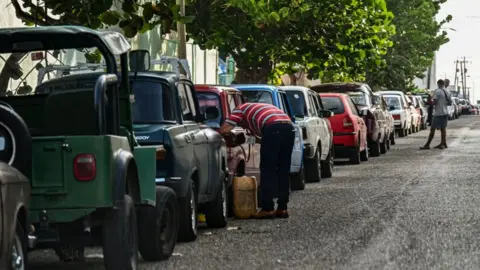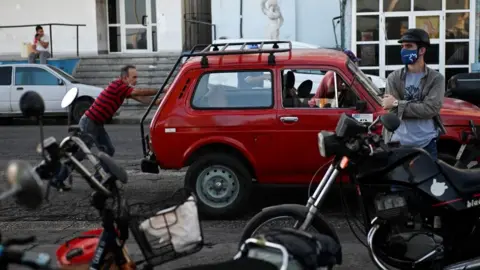Fuel in Cuba to become five times more expensive
 Getty Images
Getty ImagesThe Cuban government has announced a five-fold increase in fuel prices as it struggles with shortages and a deepening economic crisis.
It said that from February the price of a litre of petrol would rise from from 25 pesos ($0.20; £0.16) to 132 pesos.
The government, which subsidises many goods, hopes this will help to reduce its deficit.
It is the latest measure making life more difficult for cash-strapped Cubans.
Finance minister Vladimir Regueiro said the cost of diesel and other types of fuel would face similar mark-ups. He also announced a 25% increase in electricity prices for major consumers in residential areas, as well has hikes in costs for natural gas.
Mr Regueiro said the government would also open 29 new petrol stations which will solely accept payment in US dollars in order to raise foreign currency to purchase fuel on the international markets.
"These measures are aimed at reviving our economy," Mr Regueiro told state television on Monday.
Cuba has been hit hard by economic turmoil, blamed on the coronavirus pandemic, the tightening of US sanctions in recent years, and structural weaknesses.
Last month, economy minister Alejandro Gil said that Cuba's communist government could no longer sell fuel at subsidised prices, emphasising it was the "cheapest in the world".
But economics professor Omar Everleny Pérez told AFP news agency that while petrol in Cuba may be cheap by global standards, when compared with salaries in the country it was "very expensive".
He added that the new price structure would affect "the whole of society".
In a nation where few people own vehicles, the rise in the cost of petrol pushes hopes of car ownership even further away.
 Getty Images
Getty ImagesCuba, which depends heavily on imports, has suffered growing shortages of food, medicine, and consumer goods for the last four years.
The price hike comes on top of rampant inflation driving up prices for basic items and stagnant salaries for state workers, upping the pressure on Cubans already struggling to make ends meet.
The fuel crisis has led to long queues forming at forecourts, which sometimes stretch for miles and mean that filling a vehicle with petrol can become a days-long ordeal. Public transportation has also been sorely affected.
Last year, the shortages forced the government to cancel Cuba's 2023 traditional May Day parade.
